Graduate Clinical Psychology Students
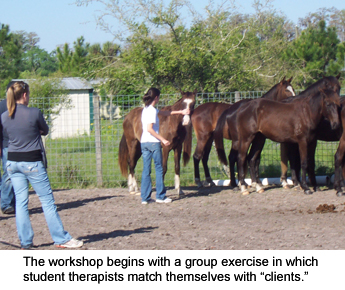
Eye of a Horse offers a unique equine-assisted experiential learning program in which graduate level clinical or counseling psychology students can hone their clinical skills by practicing non-verbal communication using a horse as a client. These extraordinary workshops offer hands-on experience—the most powerful learning tool. The feedback to the student therapist comes directly from the “client,” in that the effectiveness of the student’s communication is reflected in the reactions and responses of the horse.
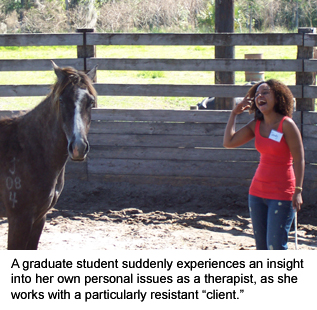 Moreover, due to the experiential nature of these unique workshops, therapist-centered issues such as emotional entanglement with clients, projection and other psychological phenomena can be explored through insights from the students themselves.
Moreover, due to the experiential nature of these unique workshops, therapist-centered issues such as emotional entanglement with clients, projection and other psychological phenomena can be explored through insights from the students themselves.
Florida Cracker horses are uniquely qualified for the role of “client,” as this special breed has retained a strong element of "survival skills," unlike many other domesticated breeds of horses, and, therefore, are supremely sensitive to their environment, including interactions with humans.
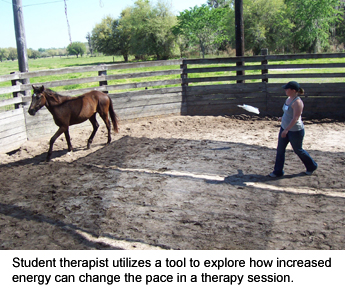
Students have responded enthusiastically to these training workshops. A psychology graduate student who attended a full day workshop wrote, “I just wanted to thank you again for the outstanding workshop you and your team provided for us on Saturday. I got so much more out of just one individual session with a horse than I have received in weeks of clinical supervision. This was an amazing experience for me to learn more about myself and to try novel ways of working with clients in a safe place. I truly hope that you are successful in creating this as a nationally recognized training medium for therapists.”
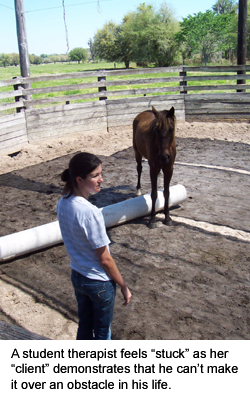 Reflecting on her own therapist-centered issues, another workshop participant stated, “The replication of myself in therapy was dead on in my interaction with the horse. [I saw] my desire to rescue, my fear to rupture the relationship, and my hesitation to trust and believe that the relationship is secure and strong enough for me to sit back a little and let my client work more than me.”
Reflecting on her own therapist-centered issues, another workshop participant stated, “The replication of myself in therapy was dead on in my interaction with the horse. [I saw] my desire to rescue, my fear to rupture the relationship, and my hesitation to trust and believe that the relationship is secure and strong enough for me to sit back a little and let my client work more than me.”
Another student reported on her own issues as a therapist as they surfaced in the experiential sessions: “I learned that confidence does not equal assertiveness. Although I am confident and grounded, I do not like conflict. When I place a command, it sometimes sounds more like a question or pleading. I had this same problem with more than one horse, indicating that it is a projection of my own issues.”
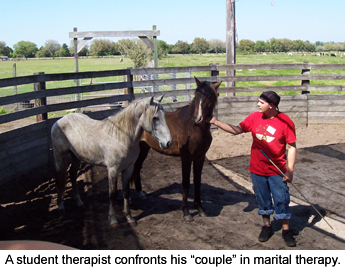
Many participants, like the following psychology graduate student, come away from the workshop with a renewed sense of confidence. “I loved the experiential nature of the workshop because it helped me identify personal strengths and weaknesses that I didn’t know I have. I had a particularly impactful first session in which I had a horse who was very mistrustful, and it was so amazing being able to learn how to pace with the horse and build trust with a mix of confident assertiveness and space. It was a really fine balance, and it felt like such an accomplishment to have him finally trust me enough to meet his goals.”
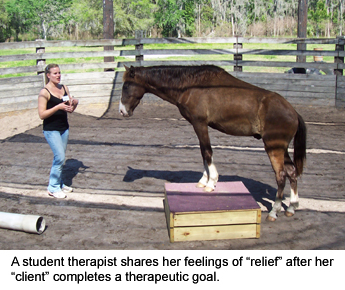 The metaphorical nature of this program often has a profound effect on student therapists, due to the fact that metaphors, by nature, can represent anything that is meaningful to the observer or participant. Here a student comments, “[I liked] using my right brain to understand dynamics/clinical interactions with clients. Also, the ‘clients’ were magnificent; perfect metaphors for therapeutic work and the special bond between patient and therapist; and, of course, the guide, Dr. Wise—great energy and natural skill. Awesome to be a part of.”
The metaphorical nature of this program often has a profound effect on student therapists, due to the fact that metaphors, by nature, can represent anything that is meaningful to the observer or participant. Here a student comments, “[I liked] using my right brain to understand dynamics/clinical interactions with clients. Also, the ‘clients’ were magnificent; perfect metaphors for therapeutic work and the special bond between patient and therapist; and, of course, the guide, Dr. Wise—great energy and natural skill. Awesome to be a part of.”
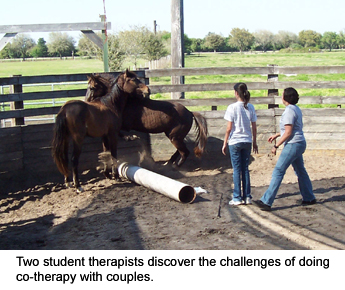
Although any number of insights can be garnered from these experiential workshops, it is noteworthy that this student was able to grasp the parallels between the equine interactive behaviors and the dynamics that occur in family therapy. The student stated, “The symbolism of systems theory became apparent when a student [therapist] tried to change the patterns of two ‘clients' behavior. They were resistant to change and attempted new behaviors in order to maintain the status quo. Also, when the student [therapist] focused only on one ‘client’ the other altered his behavior in an attempt to gain her attention—much like a child acts out when the focus has been taken off of them in therapy.”
A psychology graduate student explains equine-assisted learning and shares her perspective after completing a workshop and engaging in a particularly challenging individual session (excerpts from actual session included).
Curtis, a psychology student at Florida Institute of Technology, explains the human-horse interaction, describing how and why horses fit into a psychotherapeutic model of treatment. He relates, through his personal story of sustaining a spinal cord injury and struggling with rehabilitation, how he chose to become a psychologist, with the goal of helping other persons with disabilities through equine-assisted psychotherapy.
Dr. Sandra Wise gives a brief tutorial before entering the horse arena and round pen to provide these psychology graduate students from the University of Central Florida with an experiential learning session.
Maria, a fourth-year doctoral psychology student at Florida Institute of Technology, uses equine-assisted learning to work on the following psychotherapy skills: reading intentionality, therapist-client relationship, balance point, leading vs. pushing a client, eye-contact, and dealing with a client who isn't making progress.

